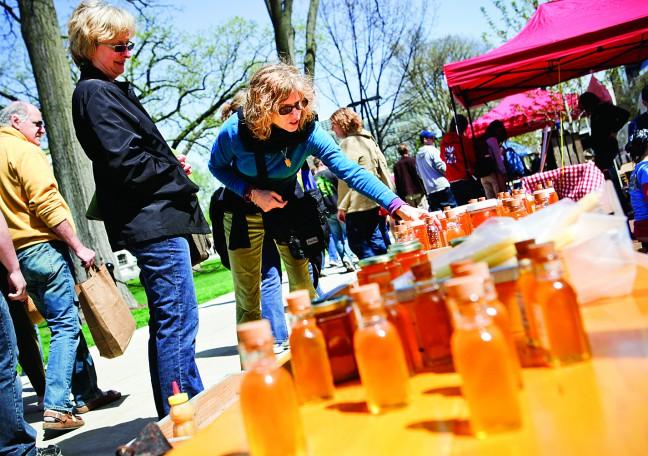In an effort to continue farmers’ market access to low-income community members in Madison, the city has put out a call for a new organization to facilitate its program to allow Supplemental Nutrition Assistance Program to buy at the markets.
Electronic Bank Transfers is a system that provides SNAP users access to benefits at the Dane County Farmers’ Market and some smaller markets throughout Madison.
Dane County Farmers’ Market Manager Bill Lubing said the program operates by having a machine present at the farmers’ market where individuals can use their SNAP benefits card and attain “market dollars.” Vendors can then redeem these “market dollars” for checks from whomever participates in the program.
Mark Woulf, food and alcohol policy coordinator for the city, said Madison and Dane County partnered to find a new operator for the program after the Community Action Coalition said it would not be able to operate the program anymore due to budget issues.
The city developed the request for proposals in search of an organization that could operate the Dane County Farmers’ Market EBT program for the rest of the year while also seeking an option to expand the program to markets that do not currently offer the program for SNAP users, Woulf said.
He said the city is interested in also finding an operator for its farmers’ market incentive program, MadMarket Double Dollars. Piloted last year, it was ultimately funded by city health care providers to provide a matching dollar for SNAP users at farmers’ markets, he said.
“We definitely want to encourage these programs at some of the smaller markets because they are more accessible to SNAP users,” Woulf said. “We’re trying to concentrate on areas where there is a density of SNAP users.”
The farmers’ market is continuously trying to find ways to reach out to low-income consumers to increase accessibility to locally produced food and reduce the presence of food deserts, Lubig said. A food desert is an urban area where it is difficult to buy affordable or good-quality fresh food.
Last year, the EBT program saw more than $50,000 worth of transactions, Lubig said.
The farmers’ market has also been reaching out to low-income communities through its outreach and education methods. Lubig said many EBT program users may not have a full kitchen or know about many of the ingredients that are sold at the farmers’ market.
The farmers’ market releases weekly newsletters that offer recipe ideas and raise awareness of the program for eligible users who may not know about it, he said.
“We want to make the farmers’ market a mainstream experience, so everyone feels comfortable going there just like they feel comfortable going to the grocery store,” Lubig said. “It’s nothing special, just where they buy their food. And we want everyone to feel that way, whether they’re shopping with EBT or with a gold-lined bag.”
The city is asking for proposals to be in by May 12, which will then reviewed by the City Council and County Board for a final decision by the end of the month.












